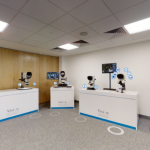~ Why you should create partnerships and avoid transactional relationships in mission-critical industries ~
Reliability and longevity are some of the hallmarks of industrial systems used in the Defence sector, with systems often expected to be in place for decades. However, it is often the case that when purchasing systems from third-party sellers, they are not the optimal solution for the job and, because relationships end at the point of sale, ongoing support is minimal at best. Here Kurt Canfield, Managing Director at defence systems integrator Delkia, discusses the need to build long-lasting partnerships in mission-critical industries like the Defence sector.
When it comes to working with industries like the Defence sector, being a trusted partner is more than just an abstract concept used to make a company sound good to clients. Being a trusted partner delivers tangible benefits for clients, often in the form of lower costs, improved project delivery speeds and overall lower risk. Crucially, building relationships and improving knowledge of the client’s operational context facilitates better decision making from both the company and the client. For example, understanding things like DEF STAN 00-055 / 056 requirements for Defence projects means you can help clients navigate it over the safety system’s lifecycle.
When relationships are simply transactional, things become apathetic and the true value of working with companies who understand your business needs is lost. When there are not relationships in place to facilitate openness about strategy, mission goals, operational constraints and the working environment, companies cannot align their offering with your goals and deliver the maximum value.
Superior support
Buying solutions directly from a trusted partner with knowledge of your systems and operational needs ensures that each part of your system works seamlessly with the rest. This means you can buy solutions safe in the knowledge they are compatible with your network infrastructure and will interact with your top end supervisory control and data acquisition (SCADA) system as intended.
Crucially, buying solutions from a company with knowledge of your systems drastically lowers project costs and reduces operational disruptions associated with installation because much of the testing and validation can be done off-site. There is also additional confidence that comes from dealing with a company whose engineers are competent and certified to work in highly-regulated sectors like Defence.
I regularly hear stories from clients who have previously bought systems from third party sellers and found they are unable, or unwilling, to provide the support needed to fix any problems that arise down the line. Resulting in contractual and commercial issues. This issue is easily avoided by working with trusted partners who will generally go the extra mile to understand your programme and project success criterion.
Furthermore, when dealing with a partner you know, you can just pick up the phone and speak directly to engineers with an intimate knowledge of your systems (from requirements to implementation) — in many cases these are the same engineers who integrated your systems in the first place. This level of service cannot be matched if relationships are simply transactional and end at the point of sale. Ultimately, dealing with a partner you can trust helps to protect your investment by helping to keep your programme on track, operational for longer and minimising any costly unplanned downtime.
From systems software development to independent functional safety audits (FSA) or even full system design and build solutions, Delkia’s specialist engineers can deliver a range of projects across the Defence sector and have a strong reputation as a trusted partner in the industry. To find out more, visit www.delkia.co.uk/defence or give us a call on +44 (0)1946 812288.





